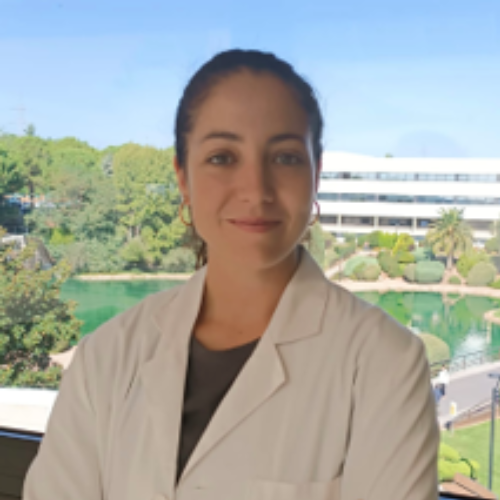
- elisa.garcia@universidadeuropea.es
- Faculty of Medicine, Health and Sport - Madrid
- Edificio D, área de profesores, campus Villaviciosa de Odón
Associate Professor
Elisa García García
- Biomedicine and Health
- Sciences
Graduated in Physiotherapy and Physical Activity and Sports Sciences from Universidad Europea de Madrid. Director of the Master's degree in the comprehensive approach to the pelvic floor. Master's degree in the comprehensive approach to the pelvic floor and Expert in physiotherapy in pelvic perineology, manual lymphatic drainage, and sports rehabilitation. She teaches subjects in the 1st, 2nd, and 4th years of the Bachelor's degree in Physiotherapy, as well as in the 5th year of the Double Degree in Physical Activity and Sports Sciences and Physiotherapy in Spanish, English, and Italian. Supervisor of Bachelor's and Master's Theses. She is a member of the research group "Women & Health," whose lines focus on Women's Health, Exercise as a driver of well-being, Ultrasound of the Abdomino-pelvic Sphere, Pelvic floor and its functionality, Motor control of the Abdomino-pelvic Sphere, Lymphatic and vascular system. Author of multiple communications and live presentations at national and international conferences, as well as popular science books on women's health.
Academic background
PhD candidate at Universidad Europea
- Universidad Europea de Madrid
Official Master's degree in the comprehensive approach to the pelvic floor
- Universidad Europea de Madrid
Double degree in Physical Activity and Sports Sciences and Physiotherapy
- Universidad Europea de Madrid
Professional experience
Degrees
Publications
Cervical Impairments in Subjects with Chronic Migraine: An Observational Study
Deep Cervical Muscles and Functionality in Patients with Chronic Tension-Type Headache: An Observational Study
Median nerve neural mobilization adds no additional benefit when combined with cervical lateral glide in the treatment of neck pain: A randomized clinical trial
Research projects
Jose Angel Del Blanco Muñiz
Effectiveness of Different Physiotherapy Techniques in Post-Effort Recovery After the Generation of DOMS. A Randomized Controlled Study